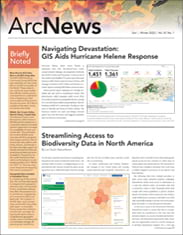Whether pinpointing the impacts of global events or mapping various conditions that affect societies and ecosystems, geographers, like other researchers, strive to be accurate, objective, and credible. Yet there are other crucial and complementary values that can be elevated as well to strengthen research, such as committing to fairness, mentorship, and connection and striving to support the whole person. These values are the backbone of a care-focused approach to supporting geographers of all backgrounds so they can flourish in long and fruitful careers.
How is it possible to balance rigor and care in research while also staying attuned to and addressing geographers’ less visible needs, particularly those of people who have been—and still are—underrepresented? The American Association of Geographers (AAG) took on this challenge when it piloted a toolkit called TLC GRAM, which stands for training, listening, communications, governance, reports, advocacy, and membership. It is as set of inventory- and listening-based tools for assessing and addressing care work within a department or institution.

When I first designed this toolkit with the AAG committee that’s focused on fostering inclusion and promoting fairness, the intent was to guide AAG’s own efforts to fulfill its strategic plan, which recognizes inclusion and fairness as essential to strengthening the geography discipline. Now, the toolkit is contributing to the creation of a framework for building a culture of care across the field of geography. It addresses the value of listening; exchanging diverse perspectives; and building on existing practices to advance institutional support for employees, faculty, and students.
What Is a Culture of Care?
A culture of care, as defined by the Othering and Belonging Institute at the University of California, Berkeley, involves intentionally engaging in practices that foster connection and growth. This includes “bridging”—creating an ongoing feedback loop between idealistic policies and their real-world application in communities, as shaped by people’s lived experiences.
A culture of care exists within, despite, and often because of uncaring conditions that might otherwise prevail. The institute encourages people to proactively examine and address how systems either embody or fall short of care. In this sense, a culture of care is viewed as a positive, generative type of resistance and adaptation.
Bringing Care to the Forefront
The TLC GRAM toolkit helps leaders elevate the act of caring for colleagues by conducting focused listening sessions with collaborators—such as employees, faculty, students, or community members—and then analyzing the care strategies identified during those listening sessions to carefully measure outcomes. Anyone filling out the toolkit worksheet is encouraged to list the caring strategies or practices they have already planned or implemented and assess which of the following domains they may show up in:
Caring Domains (TLC)
- Training, including professional development, programming, and resources
- (Focused) Listening to promote optimal and actionable dialogue
- Communications, both promotional and interpersonal
Measuring Domains (GRAM)
- Governance that works to identify and address systemic and structural barriers
- Reports that assess policies, practices, and progress
- Advocacy that advances inclusionary aims and applies collective expertise and skills to support policy
- Membership strategies that encourage participation and improved representation
TLC GRAM helps leaders collaboratively inventory their planned activities, policies, practices, and procedures to assess how they show up in each of the care (TLC) or measurement (GRAM) domains. Through practicing active listening and paying attention, the inventory pinpoints opportunities for alignment, areas that overlap, and gaps in planning. The toolkit helps leaders refine their brainstorming into shared goals and clear next steps.
An Enduring Commitment to Care
The work that goes into creating more equitable, caring departments and organizations is deeply systemic and sometimes unpredictable. The TLC GRAM framework creates a call to action to begin—or start over—with the understanding that fragmentary or faulty efforts can be expected.
A robust plan, despite any stumbling blocks, can inspire people to stay the course and rededicate themselves to nurturing and embedding caring practices into institutional systems. As geographer Ruth Wilson Gilmore said, “What the world will become already exists in fragments and pieces, experiments and possibilities.”
Let’s bring the pieces together and bravely pursue the possibilities for geographers.


